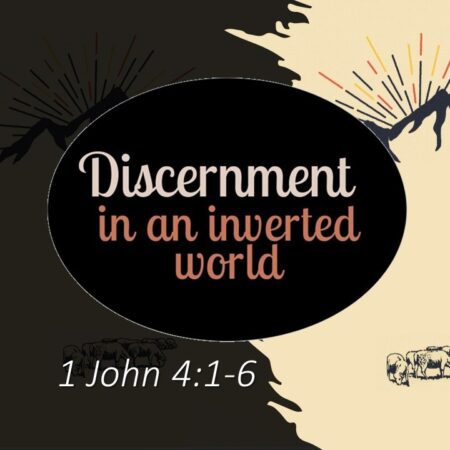1 John 4:1-6
Quick facts on 1 John: (Swindoll’s Living Insights New Testament Commentary vol.14 Page 10).
It was written around AD 90.
It was written either in Ephesus or Patmos by John the apostle, son of Zebedee
Why was it written?
So that believers would have fellowship with the Father and the Son and fellowship with one another in the Spirit resulting in a joyful clean discerning and confident life. (1: Jn. 1:3-4; 2:1; 5:13).
• Fellowship produces a joyful life (1:1-10).
• Fellowship produces a clean life (2:1-17).
• Fellowship produces a discerning life (2:18-4:6)
• Fellowship produces a confident life (4:7-521)
• Spirit = pneuma (Strongs 4151) “breath or wind”
• Test = dokimazo (Strongs 1381) to examine, check it out, is it really authentic.
• Confess or acknowledge = homologeo (Strongs 3670) factual, wholehearted, a profession of allegiance ie (Titus 1:16).
• Truth versus Error
• Children of God versus antichrist (those in the world, those from the world, see also Eph.2:1-10).
• We are victors not victims.
Quote from Francis A Schaeffer, Two Contents, Two Realities
…First it means Jesus had an eternal pre-existence as the second person of the Trinity, and then it means he came in the flesh. When a prophet or a spirit comes to you, the test of whether he should be accepted or rejected is not the experience that the spirit or prophet gives you nor is it the strength of the emotion which the spirit or the prophet gives you. Nor is it any special outward manifestation that the spirit or the prophet may give you. The basis of accepting the spirit or prophet—and the basis of Christian fellowship—is Christian doctrine. There is no other final test. Satan can counterfeit and he will.
Also Francis A. Shaeffer states in his book “The Church at the end of the 20th Century page 103,
. . . biblical Christianity must make very plain that it will deal only with hot communication. Biblical Christianity rest upon content, factual content. it does not cause people to react merely emotionally in the first-order experience.
. . . Our faith must be discriminating, discerning, distinguishing faith.
“Do not believe every spirit” and “test the spirits” (4:1).
Seven Statements: ( From Chuck Swindoll’s Living Insights New Testament Commentary page 108).
1). Never forget that we’re living in treacherous times (Matt.24:11; 2Tim.3:1-9).
2). Doctrinal discernment plays a vital role in surviving . . . and thriving (2 Tim. 3:14-16 1 Tim.4:1-16).
3). Historical roots and doctrinal truth must continue to be valued and embraced (1 Pet.1:10; Jude 1:1-25).
4). Each generation of believers has a serious responsibility to keep the faith ( 2Tim.3:10-17).
5). The church’s leaders are called to guide well the church’s ministry (Eph.4:1-16).
6). The church’s leaders are given the task of guiding the church’s people (Eph.4:1-16; Acts 20:28-32).
7). A strong and healthy church today is no guarantee of the same tomorrow (1 Tim. 4:1).

